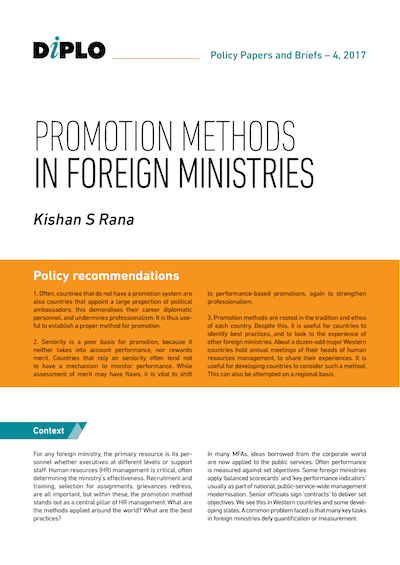
DiploNews – Issue 329 – 1 August 2017
Upcoming study and training opportunities
Humanitarian Diplomacy Diploma course – last few places available
We have a few places left in the next session of the online course Humanitarian Diplomacy, offered in cooperation with the International Federation of Red Cross and Red Crescent Societies (IFRC). This highly interactive 13-week course, led by Ambassador Christopher Lamb and a team of experienced practitioners, extends the knowledge base and develops practical skills of current and future practitioners in humanitarian diplomacy and policy. The course familiarises participants with basic definitions, concepts, actors, and institutions in the field of humanitarian diplomacy; introduces international humanitarian law; hones advocacy and negotiation skills; develops participants’ research skills; and increases their understanding of national and regional humanitarian diplomacy activities.
The course is offered in English; however, participants have the option to write and submit major course assignments and the final research paper in French or Spanish.
The next session starts 11 September 2017. Please visit the course webpage to read more and apply as soon as possible.
New course on Negotiation Skills
Non-traditional areas of diplomacy (education diplomacy, health diplomacy, Internet governance, humanitarian diplomacy, development diplomacy, and more) require the use of diplomatic skills to build bridges across sectors, diverse actors, and borders. This course on Negotiation Skills, offered by DiploFoundation and the Center for Education Diplomacy, is a practical, interactive course that equips participants with the skills to successfully prepare, undertake, and conclude negotiations in formal and informal settings with government and non-government actors alike. The course introduces the concept and principles of negotiation and reflects on the role of power and empathy in negotiation. It introduces key skills supported by case studies and practical learning activities, including an online simulation exercise. Rather than going into the theoretical considerations of negotiation, such as game theory or group decision-making theory, the course focuses on key skills that are valuable for a variety of negotiations. This new online course starts on 18 September 2017. Read more on the course webpage and apply by 21 August 2017.
Applications open for the 2018 Master/Postgraduate Diploma in Contemporary Diplomacy
Diplo is now accepting applications for the 2018 Master/Postgraduate Diploma in Contemporary Diplomacy, and the Master/Postgraduate Diploma in Contemporary Diplomacy with a specialisation in Internet governance. These unique postgraduate programmes, offered in co-operation with the University of Malta, include a 10-day residential workshop in Malta followed by 16–20 months of online learning. Visit the Master in Contemporary Diplomacy webpage to read more. Scholarships covering 20–50% of the Postgraduate Diploma fee are available for applicants from small and developing states. The programme starts on 5 February 2018. The application deadline is 15 October 2017 for international applicants and 15 November 2017 for Maltese applicants.
Autumn courses on diplomacy and digital policy
Diplo offers a wide range of exciting online courses this autumn, starting the week of 3 October.
- Consular and Diaspora Diplomacy
- Cybersecurity
- Development Diplomacy
- Economic Diplomacy
- Language and Diplomacy
Apply by 7 August 2017 for University of Malta accredited courses and by 4 September 2017 for Diplo certificate courses. For further information or to apply, click on the titles of the courses above, or visit our courses webpage. Register now to reserve your place.
Malta scholarships
Thanks to support from the government of Malta, partial scholarships are available for applicants from developing countries to attend upcoming Diplo online courses. These scholarships cover 30–70% of course fees and can be applied to most online courses in 2017. Browse our course catalogue and contact us at admissions@diplomacy.edu for further information.
For more information on any of our courses and on partial scholarships, contact admissions@diplomacy.edu. You can also sign up for our courses mailing list to be informed about upcoming courses.
Diplo’s new series of Policy Papers and Briefs

- Dr Jovan Kurbalija explains the Internet root zone and highlights the context and controversy of questions about its inviolability.
- Ms Barbara Rosen Jacobson looks at the potential, risk, and future of MIKTA, a co-operation scheme comprised of Mexico, Indonesia, the Republic of Korea, Turkey, and Australia, which was officially launched in September 2013.
- Dr Katharina E Höne makes recommendations for Namibia’s digital foreign policy and diplomacy, and looks at the discourse on information and communication technology (ICT) and development.
- Ambassador Kishan S. Rana shares his insights in a comparative perspective on promotion methods in foreign ministries. He introduces the distinction between merit-based, seniority-based, and ad-hoc promotions, and highlights the different exam methods used in foreign ministries.
Mid-year review of Internet governance
Six months into 2017, Dr Jovan Kurbalija revisits the annual forecast of digital policy for 2017, and what to expect until the end of the year. The digital weather remains unsettled; various crises brought occasional storms; Internet growth and innovation triggered a few sunny spells. Read the mid-year analysis.
Our monthly briefings on Internet governance, on the last Tuesday of every month, will be back in August. Join us on 29 August; registrations are now open.
Artificial intelligence: Policy implications, applications, and developments
The field of artificial intelligence (AI) has seen significant advances over the past few years, in areas such as smart vehicles and smart buildings, medical robots, communications, and intelligent education systems. Internet companies are increasingly developing AI tools to respond to different needs. These and similar advances are expected to have implications in several policy areas (economic, societal, education, etc.), and governments and private sector actors worldwide are increasingly considering them. Visit our new space dedicated to AI, on the Digital Watch observatory, which analyses the implications, applications, and developments.
Diplo is on Instagram!
We’re now on Instagram! Follow us (@DiploFoundation) and tag us on your photos from our events and programmes!



